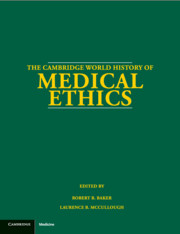Book contents
- Frontmatter
- PART I AN INTRODUCTION TO THE HISTORY OF MEDICAL ETHICS
- PART II A CHRONOLOGY OF MEDICAL ETHICS
- PART III DISCOURSES OF MEDICAL ETHICS THROUGH THE LIFE CYCLE
- PART IV THE DISCOURSES OF RELIGION ON MEDICAL ETHICS
- PART V THE DISCOURSES OF PHILOSOPHY ON MEDICAL ETHICS
- PART VI THE DISCOURSES OF PRACTITIONERS ON MEDICAL ETHICS
- PART VII THE DISCOURSES OF BIOETHICS
- PART VIII DISCOURSES ON MEDICAL ETHICS AND SOCIETY
- Ethical and Legal Regulation of Medical Practice and Research
- B Medical Ethics, Imperialism, and the Nation-State
- 52 Colonialism, Imperialism, and the History of Latin American Medical Ethics
- 53 Japanese Doctors’ Experimentation, 1932–1945, and Medical Ethics
- 54 Medical Ethics and Nazism
- 55 Medical Ethics and Communism in the Soviet Union
- 56 Medical Ethics and Communism in Eastern Europe
- 57 The Ethics of Military Medical Research in the United States during the Cold War
- 58 Medical Ethics and the Military in South Africa during Apartheid: Judging History
- C Medical Ethics and Health Policy
- Appendix: Biographies: Who Was Who in the History of Medical Ethics
- Bibliography
- Index
58 - Medical Ethics and the Military in South Africa during Apartheid: Judging History
from B - Medical Ethics, Imperialism, and the Nation-State
Published online by Cambridge University Press: 28 May 2012
- Frontmatter
- PART I AN INTRODUCTION TO THE HISTORY OF MEDICAL ETHICS
- PART II A CHRONOLOGY OF MEDICAL ETHICS
- PART III DISCOURSES OF MEDICAL ETHICS THROUGH THE LIFE CYCLE
- PART IV THE DISCOURSES OF RELIGION ON MEDICAL ETHICS
- PART V THE DISCOURSES OF PHILOSOPHY ON MEDICAL ETHICS
- PART VI THE DISCOURSES OF PRACTITIONERS ON MEDICAL ETHICS
- PART VII THE DISCOURSES OF BIOETHICS
- PART VIII DISCOURSES ON MEDICAL ETHICS AND SOCIETY
- Ethical and Legal Regulation of Medical Practice and Research
- B Medical Ethics, Imperialism, and the Nation-State
- 52 Colonialism, Imperialism, and the History of Latin American Medical Ethics
- 53 Japanese Doctors’ Experimentation, 1932–1945, and Medical Ethics
- 54 Medical Ethics and Nazism
- 55 Medical Ethics and Communism in the Soviet Union
- 56 Medical Ethics and Communism in Eastern Europe
- 57 The Ethics of Military Medical Research in the United States during the Cold War
- 58 Medical Ethics and the Military in South Africa during Apartheid: Judging History
- C Medical Ethics and Health Policy
- Appendix: Biographies: Who Was Who in the History of Medical Ethics
- Bibliography
- Index
Summary
INTRODUCTION
It is well recognized that physicians in the military confront ethical challenges emerging from the dual loyalties of the role of physician, to protect and promote the health-related interests of the patient, and that of the military officer, to protect and promote the legitimate interests of the state through the application of organized violence (or threat of same). The justification for military physicians using medical knowledge for purposes of state interests other than healing patients becomes an ethical challenge, especially when the health or even lives of patients or others are put at risk when physicians pursue such purposes (see Chapters 53 and 57). The role of military medicine in South Africa during apartheid provides a crucial case study of military medical ethics during the post-World War Ⅱ period. The purpose of this chapter is to explore the ethical issues raised by the conduct of physicians in the service of the South African state and its policies of apartheid.
This chapter examines critically the “just war” justification of using medical knowledge and skill for purposes of the state other than healing patients. This justification is found wanting in the context of international statements on medical ethics that make the role of physician and its moral obligations primary. For example, the Declaration of Geneva commits a physician to not using “medical knowledge contrary to the laws of humanity” (WMA 1948, 1).
- Type
- Chapter
- Information
- The Cambridge World History of Medical Ethics , pp. 633 - 640Publisher: Cambridge University PressPrint publication year: 2008



